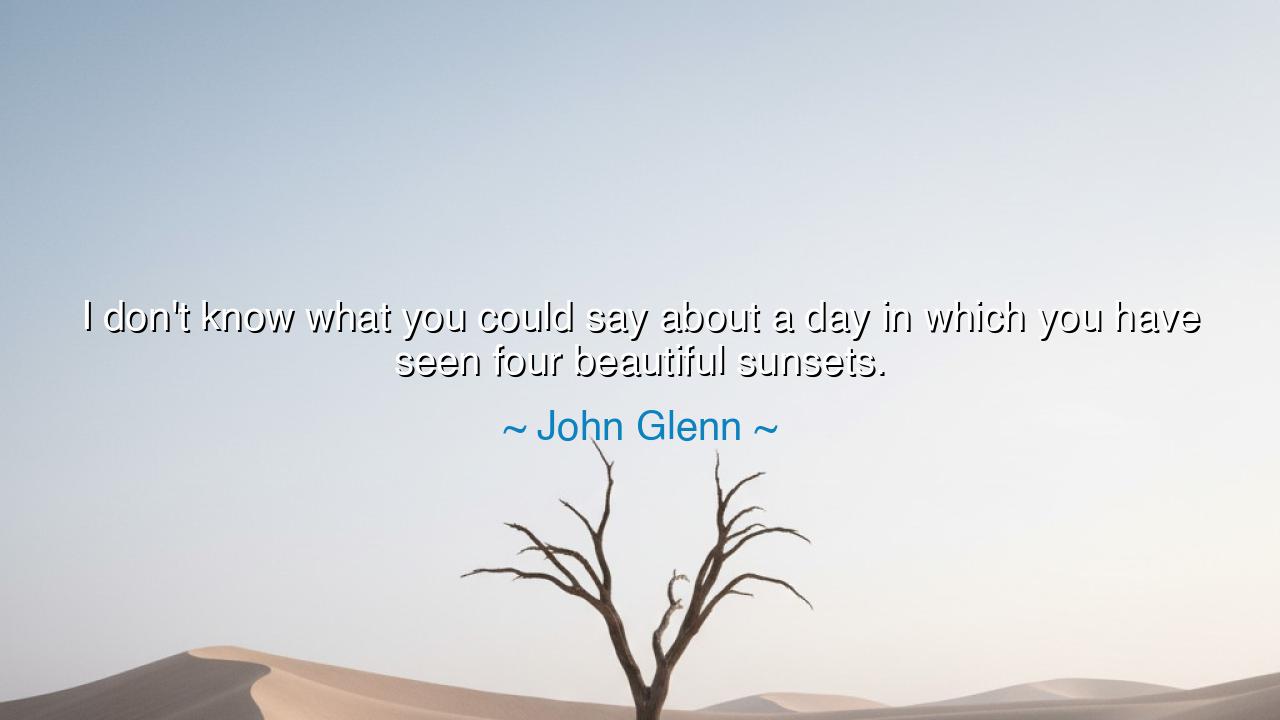
I don't know what you could say about a day in which you have
I don't know what you could say about a day in which you have seen four beautiful sunsets.






"I don't know what you could say about a day in which you have seen four beautiful sunsets." — these words, spoken by the legendary astronaut John Glenn, resonate with a profound sense of awe and gratitude for the simple yet extraordinary beauty of the universe. Glenn’s statement captures a truth about life that is often overlooked in the rush of daily existence: sometimes, the most remarkable moments are not those of achievement or progress, but those moments that invite us to pause, to witness, and to appreciate the marvels of the world around us. To see four sunsets in a single day is to witness the world in a way that transcends the ordinary; it is to recognize that life itself is full of wonders, if we only take the time to look.
In the ancient world, the heavens and natural beauty were often seen as the manifestations of the divine, as reflections of the gods themselves. The Greeks, in particular, viewed the sunset not merely as the end of the day, but as a symbol of transition—the shift between light and darkness, life and death. For them, each sunset was an opportunity to reflect on the fleeting nature of time, the beauty of the present moment, and the possibility of renewal. It is said that Pythagoras, the ancient philosopher, used to meditate at sunset, seeing the setting sun as a time to align himself with the rhythm of the universe. Like Pythagoras, Glenn’s reflection on four sunsets speaks to the importance of slowing down to appreciate the natural world, allowing ourselves to be enveloped by the beauty of the moment.
For John Glenn, a man who spent his life pushing the limits of human possibility, his statement about the sunsets is a profound acknowledgment of the deeper, spiritual dimensions of the universe. As one of the first Americans to orbit the Earth, Glenn was accustomed to looking at the world from a perspective few would ever experience. His travels in space allowed him to witness the Earth from the vastness of space itself, a sight that few of us can imagine. Yet, it was not just the grandeur of space that left an impression on Glenn, but the quiet, fleeting beauty of simple earthly moments—such as a sunset—that held deep significance for him. Four sunsets in a single day remind us that there is something profoundly sacred in the cycles of nature, in the regular rhythms of life.
Consider the example of Ansel Adams, the great photographer who captured the vast landscapes of America’s West. His work was not simply about documenting nature; it was about capturing its transcendent beauty, its ability to inspire awe and humility. For Adams, moments in nature were not to be rushed past but to be honored and contemplated. His famous photographs of sunrises and sunsets—the play of light across mountain ranges and valleys—remind us that the world is filled with beauty that demands our attention. In the same way, Glenn’s statement about the sunsets calls us to slow down, to take in the world around us, and to embrace the simple joys that surround us in our everyday lives.
There is a deep wisdom in Glenn’s words. In a world that constantly urges us to achieve, to advance, and to move forward, we often forget the importance of the present moment, of simply experiencing life as it unfolds. The sunset, like so many of the wonders of nature, is a reminder that beauty can be found not only in the grand moments of life but in the ordinary, fleeting experiences that we too often overlook. To see four sunsets in a single day is to be reminded that time itself is a gift—a fleeting treasure that we must cherish, not in the hustle of daily life, but in the quiet moments of stillness and appreciation.
The lesson of John Glenn’s words is clear: life’s most profound moments are often those that require us to stop, to reflect, and to appreciate the world around us. While it is important to strive, to work, and to achieve, it is equally important to make time for the simple pleasures of life. Whether it is a sunset, a conversation, or a quiet walk in nature, we must embrace the moments that connect us to something greater than ourselves. These moments remind us that there is beauty in every moment, and that fulfillment does not come solely from accomplishment, but from our ability to be present with the world around us.
In our own lives, let us take a page from Glenn’s reflection. Amid our busy routines, let us seek moments to pause, to appreciate the natural world, and to witness its wonders. Let us not become so absorbed in our pursuits that we forget to look up at the sky, to see the sun setting on the horizon, and to recognize that in that moment, we are part of something far larger than ourselves. Just as Glenn took time to reflect on the beauty of the sunsets, so too must we cultivate a practice of gratitude and awareness, finding joy in the simple, fleeting moments that make life extraordinary.






AAdministratorAdministrator
Welcome, honored guests. Please leave a comment, we will respond soon